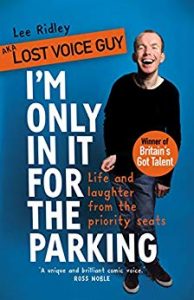 There is a big question after reading this book, and I would love to be in on the discussions: will the audiobook for I’m Only In It For The Parking be performed by Adult Voice Graham (the voice of Lee Ridley’s electronic talker) or a Geordie actor? (His inner voice is Geordie.) Or a mixture of the two? (And why is it that Lee Ridley’s voice is, for us, such an important part of him – when he cannot speak?)
There is a big question after reading this book, and I would love to be in on the discussions: will the audiobook for I’m Only In It For The Parking be performed by Adult Voice Graham (the voice of Lee Ridley’s electronic talker) or a Geordie actor? (His inner voice is Geordie.) Or a mixture of the two? (And why is it that Lee Ridley’s voice is, for us, such an important part of him – when he cannot speak?)
Lee Ridley is very funny indeed. Sections of this book had me chuckling out loud. Other sections deal with the practicalities of life with a long-term disability – in Lee Ridley’s case, cerebral palsy. Still other sections are hard-hitting political critiques of the government attitudes to people with disabilities. Only someone very clever could fuse all these together to create hilarious diatribes on government policy, in the context of their own personal experience. And this book is no doubt the watered-down version, less risqué than the live stand-up performances of Lost Voice Guy.
Lee Ridley’s difficulties with speech and movement were caused by encephalitis at six months old. The book is (very loosely) framed around questions that are (too) commonly asked him, about living with disability, such as ‘Where’s your carer dear?’ and ‘Can you have sex?’. But the tone is that of a rambling conversation which covers all aspects of Lee’s adventures in becoming independent of his parents, from childhood adventures, through special school, university, a job, and then a career as a stand-up comedian. The narrative describes Lee’s anxieties and unknowns at each turn of this journey, and the adventures that inevitably look more hilarious and less traumatic in retrospect. (Every time Lee’s electronic talker is lost or goes on the blink is a crisis – but especially in the middle of a music festival 200 miles from home with only drunk student mates for company…) An engaging narrative emerges from the difficulties in choosing between education, career and nightlife options – the consequences of which can never be clearly predicted – and Lee’s accompanying emotions. ‘Who will put on my socks’ seems to be a recurring worry.
In terms of the disability politics, Lee Ridley dissects the government’s schizophrenic attitudes to Paralympic sport and people with disabilities. At times the metaphors for the government’s strategy are vicious, for example the Hunger Games. At other moments his interactions with the Social Services are hilarious – there is a surreal conversation between Lee and a social services telephone help-line, in which the bureaucrat refuses to talk to Lee because he cannot be sure that Lee is who he says he is (using his Talker). Lee of course responds by replying that he cannot be sure who the bureaucrat is either, and so on.
If you don’t want your ‘illness narratives’ peppered with references to Newcastle United, trance and Indie music, and popular film, TV and radio, then this is not for you. But as a positive and entertaining portrayal of someone overcoming the difficulties of being without speech (complete with personal comments about Simon Cowell and the other judges on Britain’s Got Talent), there is nothing to match it.
Thoroughly recommended.
Ridley, Lee (2019) I’m Only In It For The Parking, London, Bantam Press